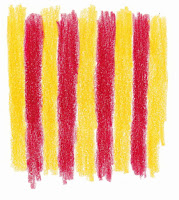"You, Benejam, stand up, please," says
Madre Mercedes del Sagrado Corazón de Jesús ("
Corazón," for short). "Tell us what you think about what I have just said."
She teaches the fifth-grade class in Quito, Ecuador, where I have recently arrived from Spain. And what she has just said is that, shortly after Columbus discovered America, Francisco Pizarro and two-hundred Spanish soldiers, impelled by greed and blood-lust, conquered the Inca empire that extended from Colombia to Chile. They captured the Inca ruler, Atahualpa, and, even though Atahualpa offered them a room filled with gold to a man's height in exchange for his life, they basely murdered him and untold thousands of others.
What,
Corazón wants to know, do I, as a Spaniard, have to say to that?
Standing in the back of the room, with my classmates' eyes upon me, I open my mouth and quickly close it. My ten-year-old mind is blank.
Corazón's account of my country's conquest of America is strangely different from what I learned just a few months ago in my history class in Barcelona.
There I was taught that the conquest of the Americas was one of the greatest achievements not only in the history of Spain, but in the history of mankind. Braving the dangers of an unknown ocean in ridiculously small boats, our fearless ancestors sallied forth to bring to the new continent our language, our culture, and, most important, the Catholic faith, thanks to which the natives stopped offering human sacrifices to their gods and started going to heaven after they died. We should feel proud, our teacher said, of what Spain did for America, and the proof was that our former colonies call Spain
la madre patria and have become our friends and allies.
Right now,
Corazón, all but sneering as I squirm, doesn't seem very friendly to me. Neither do my staring classmates, even the ones who have told me proudly that there was "a real Spaniard" somewhere in their family tree.
I scour my brain for clues from the bits of history I know. Before the conquest of America, Spain herself had been conquered in turn by Phoenicians, Carthaginians, Greeks, Celts, Romans, Goths, Visigoths, Vandals, and Moors. They had swept over the peninsula leaving blood and carnage, but also roads, temples, aqueducts, and mosques, in their wake. Just two centuries ago the French under Napoleon had invaded Spain. Does this mean that I should hate Françoise, the pianist from the Paris Conservatoire who plays sonatas with my father the way that
Corazón seems to hate me?
I stare out the classroom window at the light glinting on the snows of Cotopaxi and Chimborazo, and think of ways to defend myself. "But wait!" I say, "
I haven't killed any Indians. Neither did my parents, or my grandparents, or my..."
"Sit down, Benejam," says the nun, "and be quiet. The
conquistadores were from your country, and you should be ashamed."
It strikes me, as the lesson continues and I sit fuming, that there are strong parallels between
Corazón's train of thought and the doctrine of Original Sin. Because Adam and Eve ate an apple a million years ago, I now bear the taint of sin on my soul, which means that, as a "daughter of Eve," I will be punished with menstrual periods and labor pains. How much more unfair can you get?
From that day on, whenever the subject of Spain comes up, I keep a low profile. This is especially important when we sing the Ecuadorian national anthem, which with its references to Spain as a bloody monster (
monstruo sangriento), a defeated lion (
león destrozado) roaring with impotence and spite, may cause my classmates to turn on me in a fit of patriotic fervor.
I was neither sophisticated nor carefree enough to navigate these choppy international waters. If I had stayed in Spain, I would have continued to think comfortably of the conquest of America as one of the glories of European civilization. But now, despite my anger at the way
Corazón had embarrassed me in front of my classmates, I had to admit that she might be right. Did the "gifts" of "civilization" and the one true faith really compensate all those poor Indians for their terrible losses?
Nobody explained these things to me, but I soon began to suspect that history might not always be an exact account of what really happened. Perhaps what I read in the history textbooks had been written to make children grow up to be patriots who would defend their country no matter what. But if one nation's story of glory and heroism could be another nation's story of suffering and pain, what did patriotism really mean? (To be continued.)










